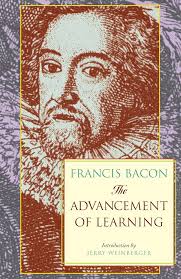The Advancement of Learning Page #37
The Advancement of Learning, published by Francis Bacon in 1605, is a foundational text in the history of science and philosophy. In this work, Bacon advocates for empirical research and the systematic organization of knowledge, laying the groundwork for the scientific method. The book critiques existing scholarly practices and proposes a new approach to learning based on observation and experimentation. It marks a significant shift towards modern scientific inquiry.
- Year:
- 1605
- 1,170 Views
Submitted by acronimous on August 11, 2024
Modified by acronimous on August 11, 2024
of death. (5) In the consideration of the cures of diseases, I find a deficience in the receipts of propriety, respecting the particular cures of diseases: for the physicians have frustrated the fruit of tradition and experience by their magistralities, in adding and taking out and changing quid pro qua in their receipts, at their pleasures; commanding so over the medicine, as the medicine cannot command over the disease. For except it be treacle and mithridatum, and of late diascordium, and a few more, they tie themselves to no receipts severely and religiously. For as to the confections of sale which are in the shops, they are for readiness and not for propriety. For they are upon general intentions of purging, opening, comforting, altering, and not much appropriate to particular diseases. And this is the cause why empirics and old women are more happy many times in their cures than learned physicians, because they are more religious in holding their medicines. Therefore here is the deficience which I find, that physicians have not, partly out of their own practice, partly out of the constant probations reported in books, and partly out of the traditions of empirics, set down and delivered over certain experimental medicines for the cure of particular diseases, besides their own conjectural and magistral descriptions. For as they were the men of the best composition in the state of Rome, which either being consuls inclined to the people, or being tribunes inclined to the senate; so in the matter we now handle, they be the best physicians, which being learned incline to the traditions of experience, or being empirics incline to the methods of learning. (9) In preparation of medicines I do find strange, specially considering how mineral medicines have been extolled, and that they are safer for the outward than inward parts, that no man hath sought to make an imitation by art of natural baths and medicinable fountains: which nevertheless are confessed to receive their virtues from minerals; and not so only, but discerned and distinguished from what particular mineral they receive tincture, as sulphur, vitriol, steel, or the like; which nature, if it may be reduced to compositions of art, both the variety of them will be increased, and the temper of them will be more commanded. (10) But lest I grow to be more particular than is agreeable either to my intention or to proportion, I will conclude this part with the note of one deficience more, which seemeth to me of greatest consequence: which is, that the prescripts in use are too compendious to attain their end; for, to my understanding, it is a vain and flattering opinion to think any medicine can be so sovereign or so happy, as that the receipt or miss of it can work any great effect upon the body of man. It were a strange speech which spoken, or spoken oft, should reclaim a man from a vice to which he were by nature subject. It is order, pursuit, sequence, and interchange of application, which is mighty in nature; which although it require more exact knowledge in prescribing, and more precise obedience in observing, yet is recompensed with the magnitude of effects. And although a man would think, by the daily visitations of the physicians, that there were a pursuance in the cure, yet let a man look into their prescripts and ministrations, and he shall find them but inconstancies and every day’s devices, without any settled providence or project. Not that every scrupulous or superstitious prescript is effectual, no more than every straight way is the way to heaven; but the truth of the direction must precede severity of observance. (11) For cosmetic, it hath parts civil, and parts effeminate: for cleanness of body was ever esteemed to proceed from a due reverence to God, to society, and to ourselves. As for artificial decoration, it is well worthy of the deficiences which it hath; being neither fine enough to deceive, nor handsome to use, nor wholesome to please. (12) For athletic, I take the subject of it largely, that is to say, for any point of ability whereunto the body of man may be brought, whether it be of activity, or of patience; whereof activity hath two parts, strength and swiftness; and patience likewise hath two parts, hardness against wants and extremities, and endurance of pain or torment; whereof we see the practices in tumblers, in savages, and in those that suffer punishment. Nay, if there be any other faculty which falls not within any of the former divisions, as in those that dive, that obtain a strange power of containing respiration, and the like, I refer it to this part. Of these things the practices are known, but the philosophy that concerneth them is not much inquired; the rather, I think, because they are supposed to be obtained, either by an aptness of nature, which cannot be taught, or only by continual custom, which is soon prescribed which though it be not true, yet I forbear to note any deficiences; for the Olympian games are down long since, and the mediocrity of these things is for use; as for the excellency of them it serveth for the most part but for mercenary ostentation. (13) For arts of pleasure sensual, the chief deficience in them is of laws to repress them. For as it hath been well observed, that the arts which flourish in times while virtue is in growth, are military; and while virtue is in state, are liberal; and while virtue is in declination, are voluptuary: so I doubt that this age of the world is somewhat upon the descent of the wheel. With arts voluptuary I couple practices joculary; for the deceiving of the senses is one of the pleasures of the senses. As for games of recreation, I hold them to belong to civil life and education. And thus much of that particular human philosophy which concerns the body, which is but the tabernacle of the mind. XI. (1) For human knowledge which concerns the mind, it hath two parts; the one that inquireth of the substance or nature of the soul or mind, the other that inquireth of the faculties or functions thereof. Unto the first of these, the considerations of the original of the soul, whether it be native or adventive, and how far it is exempted from laws of matter, and of the immortality thereof, and many other points, do appertain: which have been not more laboriously inquired than variously reported; so as the travail therein taken seemeth to have been rather in a maze than in a way. But although I am of opinion that this knowledge may be more really and soundly inquired, even in nature, than it hath been, yet I hold that in the end it must be hounded by religion, or else it will be subject to deceit and delusion. For as the substance of the soul in the creation was not extracted out of the mass of heaven and earth by the benediction of a producat, but was immediately inspired
Translation
Translate and read this book in other languages:
Select another language:
- - Select -
- 简体中文 (Chinese - Simplified)
- 繁體中文 (Chinese - Traditional)
- Español (Spanish)
- Esperanto (Esperanto)
- 日本語 (Japanese)
- Português (Portuguese)
- Deutsch (German)
- العربية (Arabic)
- Français (French)
- Русский (Russian)
- ಕನ್ನಡ (Kannada)
- 한국어 (Korean)
- עברית (Hebrew)
- Gaeilge (Irish)
- Українська (Ukrainian)
- اردو (Urdu)
- Magyar (Hungarian)
- मानक हिन्दी (Hindi)
- Indonesia (Indonesian)
- Italiano (Italian)
- தமிழ் (Tamil)
- Türkçe (Turkish)
- తెలుగు (Telugu)
- ภาษาไทย (Thai)
- Tiếng Việt (Vietnamese)
- Čeština (Czech)
- Polski (Polish)
- Bahasa Indonesia (Indonesian)
- Românește (Romanian)
- Nederlands (Dutch)
- Ελληνικά (Greek)
- Latinum (Latin)
- Svenska (Swedish)
- Dansk (Danish)
- Suomi (Finnish)
- فارسی (Persian)
- ייִדיש (Yiddish)
- հայերեն (Armenian)
- Norsk (Norwegian)
- English (English)
Citation
Use the citation below to add this book to your bibliography:
Style:MLAChicagoAPA
"The Advancement of Learning Books." Literature.com. STANDS4 LLC, 2025. Web. 10 Mar. 2025. <https://www.literature.com/book/the_advancement_of_learning_3165>.








Discuss this The Advancement of Learning book with the community:
Report Comment
We're doing our best to make sure our content is useful, accurate and safe.
If by any chance you spot an inappropriate comment while navigating through our website please use this form to let us know, and we'll take care of it shortly.
Attachment
You need to be logged in to favorite.
Log In